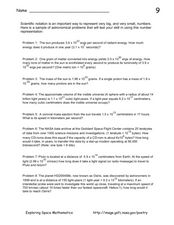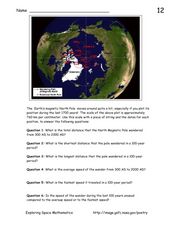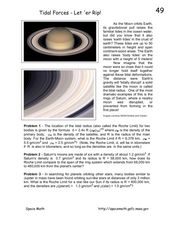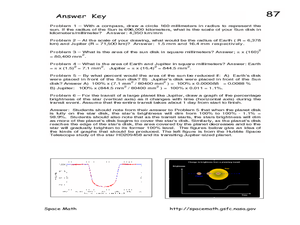Curated OER
Application of Scientific Notation
In this scientific notation worksheet, students solve eight problems about the sun, the planets and the universe using very large numbers expressed in scientific notation.
Curated OER
The Hand of Chandra!
In this nebula worksheet, students read about the Chandra X-ray Observatory that captured the given image of a pulsar and its nebula. Students solve 3 problems including using similar triangles and proportions to find the image width,...
Curated OER
Time Zones
For this time zones worksheet, students are given a map of the Earth indicating the time zones, the prime meridian and the international date line. Students answer 5 questions about solar occurrences and determine when each would be seen...
Curated OER
Is there a Lunar Meteorite Hazard?
In this lunar meteorite hazard worksheet, students read about the speed of meteorites that crash into the Moon. Students solve 2 problems including finding the impact rates of the meteorites on the Moon, determining the number of years...
Curated OER
Earth's Winds, Crust, and Atmosphere
This site provides a variety of activities and worksheets about the problem-based learning activity about Earth and its atmosphere. The lessons can be used separately or together in a geology unit. The resources and charts are very...
Curated OER
Counting Atoms in a Molecule
In this counting atoms in a molecule worksheet, students read about the molecule propanal that was discovered by the giant radio telescope in the Milky Way Galaxy. Students solve 6 problems where they find the number of atoms in the...
Curated OER
An Introduction to Space Radiation
In this space radiation worksheet, students read about the various types of radiation humans are exposed to. Students answer 5 questions based on the reading. They calculate the amount of energy gained when exposed to a certain amount of...
Curated OER
Earth's Magnetic Pole
In this Earth's magnetic pole worksheet, students use a diagram showing the changes in the magnetic pole of the Earth over time. Students use the given scale of the changes to answer 6 questions about the average speed of the magnetic...
Curated OER
Tidal Forces-Let'er Rip!
In this tidal forces worksheet, students read about the gravitational pull from the moon that causes the ocean tides. Students solve 3 problems including finding the Roche or the tidal radius for the Earth and Moon, comparing the Roche...
Curated OER
A Simple Model for Atmospheric Carbon Dioxide
In this atmospheric carbon dioxide worksheet, learners use two diagrams to solve 6 problems about atmospheric carbon dioxide. One diagram shows the Keeling Curve and the other shows sources of carbon and the natural and anthropogenic...
Curated OER
Estimating Maximum Cell Sizes
In this estimating cell sizes worksheet, learners read about the relationship between a cell's size and the rate of cell waste diffusion. Students solve 4 problems including writing the equation for the rate of waste exchange, finding...
Curated OER
Counting the Stars in Draco
In this counting stars worksheet, students construct a histogram for stars in a given star field using their apparent magnitude. Students answer 5 questions using their tabulated data and histogram to answer questions about the stars of...
Curated OER
Asteroids Between Mars and the Sun
In this asteroids of the solar system activity, students observe a diagram showing all the minor planets found in the orbit of Mars. Students answer 4 questions about the minor planets inside the orbit of other planets, they find the...
Curated OER
Magnetic Storms
In this magnetic storms and Earth's magnetic field worksheet, students use a bar graph showing the Kp Index for planetary variability. Students use the bar graph to answer 3 questions about the solar storms and their Kp values.
Curated OER
Solar Flares and Coronal Mass Ejections
In this solar flares and coronal mass ejections activity, students create a Venn Diagram with given data about solar flares and Halo CMEs. Students answer 6 questions about the events and the probability of each type of event occurring...
Curated OER
Details from an Exploding Star
In this nebula worksheet, students read about the Crab Nebula and calculate the average speed of the expanding gas. They determine the size of the smallest clumps of gas and they draw the diameter of the solar system to scale.
Curated OER
Exploring a Galaxy
In this galaxy worksheet, students use the Internet or other resources to answer 13 questions about the galaxy NGC-1232. They are given a photograph of the galaxy to help determine the width and diameter of certain regions of the galaxy.
Curated OER
Solar Surface Details
In this solar surface instructional activity, students use a photograph taken by the Swedish Vacuum Telescope to answer 6 questions about the solar features in the photograph. Students determine the scale of the image, they determine the...
Curated OER
Exploring the Ares 1X Launch-Parameters
In this rocket launch worksheet, students solve 3 problems about the Ares 1X rocket and its launch, trajectory, and motion in both the vertical and horizontal direction.
Curated OER
The International Space Station
In this International Space Station worksheet, students are given the altitude changes in the space station on a graph from 2000-2004. Students answer 5 questions about the trends in the graph, the changes in altitude, the reason for the...
Curated OER
Hinode Studies Loopy Sunspots!
For this sunspots and magnetic fields worksheet, students read about the satellite images taken showing 'loopy' patterns from solar gases and the magnetic fields on the sun. Students solve 2 problems including finding the volume of a...
Curated OER
How Much Water Is Available In The Atmosphere For Precipitation?
Students explore the relationship between the available water in the atmosphere and how it is portrayed on satellites. After examining global moisture and precipitation students research precipitation data graph the results. Using their...
Curated OER
Correcting Bad Data Using Parity Bits
In this parity bits worksheet, students read about pixels and data strings. Students are given 2 data strings that are corrupted by cosmic ray glitches and they identify the bad data and create a valid data string.
Curated OER
Kepler-The Hunt for Earth-like Planets
In this hunt for planets worksheet, learners read about the Kepler satellite used to detect exoplanets. Students solve 6 problems including drawing a sun disk and determining the scale in kilometers/millimeter, finding the area of the...

























